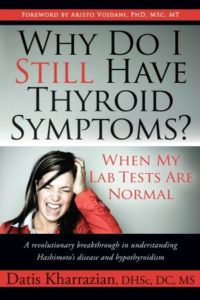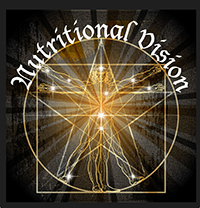BOOK REVIEW
By Katherine A. Carroll, NTP
 Why Do I Still Have Thyroid Symptoms? When My Lab Tests Are Normal by Datis Kharrazian, DHSc, DC, MS (ISBN 978-1-60037-774-7; Morgan James Publishing, LLC, 2010; www.MorganJamesPublishing.com, paperback, 316 pages; $39.99)
Why Do I Still Have Thyroid Symptoms? When My Lab Tests Are Normal by Datis Kharrazian, DHSc, DC, MS (ISBN 978-1-60037-774-7; Morgan James Publishing, LLC, 2010; www.MorganJamesPublishing.com, paperback, 316 pages; $39.99)
This is the most comprehensive, logical, and research-driven thyroid book I have ever read; a must-read not only for practitioners but anyone with confirmed or suspected low-thyroid (hypothyroid) function or Hashimoto’s (auto-immune).
Dr. Kharrazian states, “Although the standard of health care has frequently been to correct some of the problems with thyroid medication, I believe it is wiser to correct the problem that caused the thyroid to falter in the first place. Poor blood sugar control, gut infections, adrenal problems, hormonal imbalances, irregular immune function, and poor brain function are factors that can depress the thyroid or drive an auto-immune thyroid condition.”
He believes that dietary and lifestyle changes are almost always at the core of restoring thyroid health. He differentiates between functional hypothyroidism defined by depressed thyroid activity that can be nutritionally supported without the use of medication and true physiological hypothyroidism where one would need life-long medication.
Profiling patients with depressed thyroid function who have gut infections, poor blood-sugar control, adrenal fatigue, etc., Dr. Kharrazian shows how hypothyroidism is always secondary to all of these other health issues. “The outer edges of Marie’s eyebrows have virtually disappeared, her eyes and face are puffy, and she complains of always being tired, sleeping poorly and having trouble losing weight.” He shows how her high-carbohydrate diet, high sugar, and caffeine with moderate smoking have contributed to her hypoglycemia, poor adrenal function, hypothyroidism, and neurotransmitter deficiencies.
He weaves a sophisticated and complex web through patterns of low thyroid function that actually become quite simple at the center by focusing on solving the key issues:
- Stabilize blood sugar,
- Restore the integrity of the gut,
- Balance the adrenals, and
- Restore the main brain neurotransmitters, dopamine and serotonin.
His chapter on modulating the immune response is brilliant strategy in many disease scenarios as he teaches how to speed up or slow down the two pathways to produce healing. A patient speaking of her doctor, who had received the www.thyroid360.com training, says, “Dr. Mark was able to figure out that my problem was not my diabetes nor my thyroid but my immune system. It was attacking my thyroid and my pancreas causing these diseases.” By tracking health problems back to the source, many functional hypothyroid symptoms will fade and bloodspot tests will return not just to laboratory normal but to optimal functional medicine levels. Along the way, major health issues are addressed, supported, and ultimately healed.
One example of hypothyroidism as secondary to another health issue is that 20% of T4 is converted to T3 in the gut. The body can only use T3, so when the gut is inflamed or out of bacterial balance this vital conversion cannot take place. Only in the presence of healthy bowel flora will this conversion occur. Everything is interconnected and he points out that 90% of hypothyroidism is technically auto-immune Hashimoto’s where antibodies are elevated (and this should always be tested), and the thyroid is being attacked by the immune system. Hashimoto’s is strongly associated with gluten intolerance and Dr. Kharrazian demands all his Hashimoto’s patients refrain from gluten even after their antibodies test as normal. We can see clearly that gut bacteria imbalance will occur by eating foods one is sensitive or intolerant toward, therefore these patients will not convert T4 to T3. The book appeals to practical logic time and again. The same is true, he shows, with dopamine deficiency.
Through many profiles and types of patient scenarios, both common and rare, it is easy to find ourselves reflected in several of the profiles simply by checking our lab results for thyroid, blood sugar, adrenal function, and more against the optimal lab ranges he provides. He treats with an array of herbs, supplements, and transdermal creams delivering supplements that are too costly or ineffective when taken orally, and even ties in relaxation responses as adrenal repair is key to a functioning thyroid.
He blasts through recent findings, documenting sources. For instance, we’ve been led to believe we need iodine/iodide in the levels one would consume in Japan. Entire books have been written about it. His research shows that iodine given to Hashimoto’s patients will fuel the further destruction of the thyroid gland. Dr. Kharrazian shows common drugs’ effects on thyroid function so a practitioner can intelligently moderate their influence.
Because he works from the foundations outward, Dr. Kharrazian demonstrates how shortsighted and ineffective the current method of dispensing a pill is – even natural thyroid – for hypothyroidism. While it is a complicated book, by the end, the principles gel with ease and its logical approach is easily implemented with herbs, supplements, and the lifestyle changes he recommends.

No Comments Yet